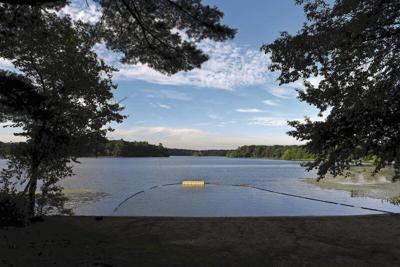ESSEX — The town beach at Chebacco Lake is once again safe for swimming after being closed down for nearly three weeks.
The Essex Board of Health announced Tuesday that the level of harmful algal bloom (HAB) in the water at Centennial Grove is under state limits for the second week in a row. For the beach to reopen, the amount of HAB needed to stay under state limits for a full week.
"I'll be asking the police to take down the (Do Not Enter) sign (at the entrance of the beach) as soon as I can," said Essex Health Agent Erin Kirchner.
According to tests conducted by Massachusetts Department of Public Health's Environmental Toxicology Program, cyanobacteria levels currently sit at 8,400 cells per milliliter of water; last week saw 1,300 cells/ml. Extended exposure to cyanobacteria can cause indigestion issues in humans and pets, as well as liver or neurological damage in some cases. MDPH requires swimming water to be below 70,000 cells/ml.
MDPH also found the amount of microcystin, another hazardous toxin, to have been at less than 1 part per billion (ppb) for the last two tests. The EPA says swimming in water with over 8 ppb of microcystin could result in adverse health effects.
The MDPH recommended the town close down Chebacco Lake, located in Essex and Hamilton, on July 24 after reviewing a photo taken that day of an algal bloom in the water at the Essex beach.
"They didn't even come by to test it," Kirchner said. "They won't test if they can see it lying on top of the water."
The rate of which HABs grow is "a combination of a lot of things, some of which are in control and some of which are not," Krichner explained. Weather conditions, sunlight and humidity are all contributing factors.
"Bacteria grows everywhere," she continued. "But when we have high fertilizer and animal waste runoff in the area, it could cause a perfect storm of conditions that causes these algae to grow exponentially."
Michael Cronin may be contacted at 978-675-2708, or mcronin@gloucestertimes.com.













